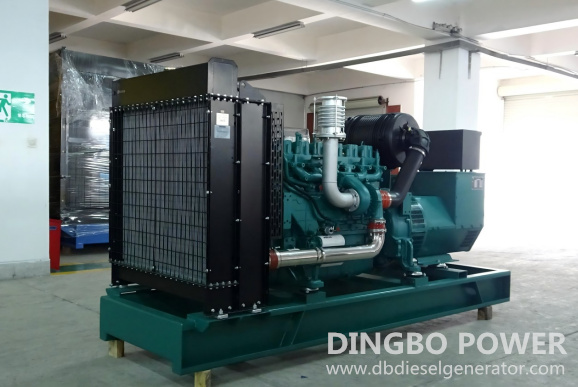dingbo@dieselgeneratortech.com
+86 134 8102 4441

- Home
- Products
- About Us
- Service
- News
- Technical Support
- Contact Us
dingbo@dieselgeneratortech.com
+86 134 8102 4441
Nov. 10, 2025
Diesel generator sets, with their advantages such as quick start-up, wide power range, and relatively convenient fuel supply, have become the guardians of power security in many places. Surprisingly, however, this seemingly powerful guardian has a unique character trait: it fears idleness. In daily use, many users find that if a diesel generator set operates under low load for extended periods, it not only fails to maintain good performance but may also trigger a series of serious failures and problems. This can lead to reduced generator lifespan, increased maintenance costs, and even failure to start normally during critical moments, resulting in significant losses for users.
So, why do diesel generator sets fear idleness? What hidden dangers lie behind low-load operation? This article will delve into this issue, exploring in detail the impact of prolonged low-load operation on various key components. It aims to help users fully understand the associated risks, thereby enabling them to adopt scientific and rational usage and maintenance strategies to ensure that diesel generator sets operate stably and reliably when needed.
During diesel generator low-load operation, the engine temperature is insufficient, leading to incomplete fuel combustion. Unburned fuel and carbon particles adhere to the pistons, combustion chamber walls, and around the valves, forming carbon deposits. These deposits reduce combustion efficiency, leading to decreased power, increased fuel consumption, and clogged fuel injectors, which worsen combustion conditions. Carbon buildup in the exhaust system increases backpressure, affecting turbocharger efficiency and potentially causing detonation.
During low-load operation of diesel generator set, the engine temperature remains low, oil circulation is poor, and effective heat dissipation is hindered. Fuel may seep along the cylinder walls into the oil pan, diluting the oil and reducing its lubricating performance. Moisture and acidic substances in the exhaust gas accelerate oil oxidation and acidification. Thinned oil fails to form an effective protective film, leading to increased wear on components such as the crankshaft and bearings. Impurities in the oil can clog filters, further reducing lubrication efficiency. In extreme cases, this may even cause a crankcase explosion.
Under low-load conditions, insufficient lubrication between piston rings and cylinder walls leads to abnormal wear. Inadequate cylinder pressure allows oil to seep into the combustion chamber, forming carbon deposits and accelerating wear. Components like the crankshaft and connecting rods may develop fatigue cracks due to abnormal vibration frequencies. Accelerated wear of key components such as cylinder liners and piston rings shortens the diesel engine's lifespan. For instance, wear on the crankshaft connecting rod journal can reach 0.85mm, eventually necessitating crankshaft replacement. Bearings may fail due to uneven stress or lubrication failure, causing abnormal noises or shutdowns.

During low-load operation, the generator's output voltage may fluctuate, and capacitive loads can cause overvoltage. The Digital Voltage Regulator (DVR) may struggle to stabilize voltage under low load, leading to failures in equipment overvoltage protection. Frequent fluctuations in power factor can cause synchronization difficulties when generators are paralleled. Overvoltage can damage power supply modules of equipment such as UPS and precision air conditioners. Voltage fluctuations may cause frequent switching between grid power and generator power, increasing contactor wear. Unstable power factors can trigger the diesel generator's protection devices, resulting in unexpected shutdowns.
Minimum load requirements: Most manufacturers recommend that the minimum load on a diesel generator set should not be less than 40% of its rated capacity. Otherwise, performance degradation or failures may occur.
Low-load operation duration: Low-load operation should be limited to no more than 15 minutes, after which the load should be gradually increased to the rated capacity to clear carbon deposits and restore normal operating temperature.
Annual full-Load test: Perform at least one full-load test annually to remove carbon deposits and verify equipment performance.
Regular maintenance: Regularly inspect and replace deteriorated oil, and clean the fuel system and filters.
Monitoring: Monitor vibration and temperature, and promptly adjust or replace worn components.
Prolonged low-load operation of diesel generator sets can lead to multiple hazards, including carbon deposits, oil deterioration, component wear, and electrical instability, which may ultimately cause equipment failure or damage. To ensure stable operation, it is essential to strictly adhere to the manufacturer's minimum load requirements, conduct regular full-load tests and maintenance, and optimize load management and electrical protection measures. Through scientific operation and standardized maintenance, the service life of generator sets can be effectively extended, ensuring reliable power supply.
Quicklink
Mob.: +86 134 8102 4441
Tel.: +86 771 5805 269
Fax: +86 771 5805 259
E-mail: dingbo@dieselgeneratortech.com
WhatsApp: +86 134 8102 4441
Add.: No. 10 Kechuang Road, High tech Zone, Nanning, Guangxi, China